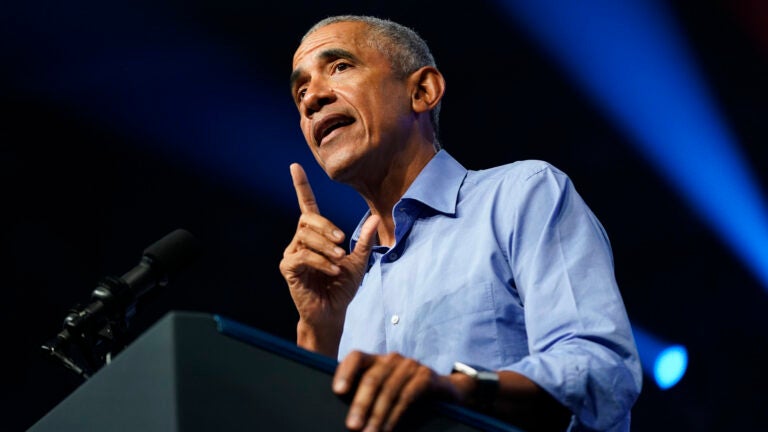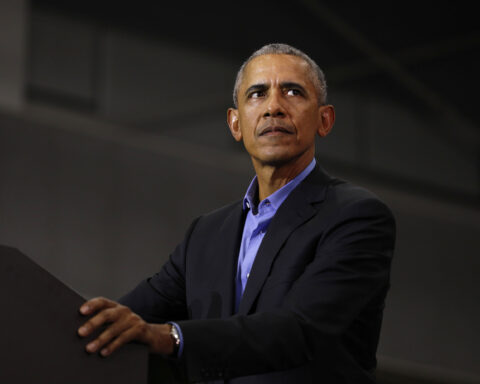By Lisa Lerer
Former President Barack Obama warned on Tuesday night that the country was “dangerously close” to allowing its government officials to act in a way “consistent with autocracies,” offering a veiled rebuke of the Trump administration that was delivered with trademark caution.
Appearing before a civic group in Hartford, Conn., during a tumultuous stretch for the country both at home and abroad, Mr. Obama offered a winding explanation about the dangers facing American democracy. He pointed to an erosion of traditional values like the rule of law, an independent judiciary, the freedom of the press and the right to protest.
“If you follow regularly what is said by those who are in charge of the federal government right now, there is a weak commitment to what we understood — and not just my generation, at least since World War II — our understanding of how a liberal democracy is supposed to work,” he said during a discussion with Heather Cox Richardson, a popular anti-Trump writer and historian.
Democracy, Mr. Obama said, requires government workers, judges and lawyers at the Justice Department to uphold the Constitution and follow the law.
“It requires them to take that oath seriously, and when that isn’t happening we start drifting into something that is not consistent with American democracy,” he said. “It is consistent with autocracies. It is consistent with Hungary under Orban.”
He went on: “We’re not there yet completely, but I think that we are dangerously close to normalizing behavior like that. And we need people both outside government and inside government saying, ‘Let’s not go over that cliff because it’s hard to recover.’”
Yet at a time when the country faces protests, political violence and the possibility of entering another foreign war, Mr. Obama kept his remarks to veiled critiques and professorial musings.
He made no mention of the growing speculation that President Trump could order the United States to openly enter the escalating war between Israel and Iran by bombing a key Iranian nuclear facility. Nor did he bring up the unusual pressures and threats the Democratic Party has been facing.
In recent days, a growing number of elected Democrats have been detained, and in some cases manhandled, by federal agents; a Democratic governor was threatened with arrest by Mr. Trump and with being “tarred and feathered” by the House speaker; and a Democratic state lawmaker in Minnesota and her husband were assassinated.
Instead, Mr. Obama encouraged others — particularly those at law firms, universities and businesses — to speak out against the demands of the Trump administration. Mr. Obama recognizes that he is unlikely to sway Republicans or Mr. Trump himself with any public critiques, so he has been focusing on issues where his words can have an effect, according to people who work with him. In April, he also called on universities and law firms to resist intimidation from the Trump administration.
On Tuesday evening, he offered a particularly stinging critique of affluent liberals before the audience in Connecticut, a wealthy Democratic state.
During his presidency, liberals felt “comfortable in their righteousness,” he said, because it wasn’t tested.
“You could be as progressive and socially conscious as you wanted and you did not have to pay a price,” he said. “You could still make a lot of money. You could still hang out in Aspen and Milan and travel and have a house in the Hamptons and still think of yourself as a progressive.” He added, “We now have a situation in which all of us are going to be tested in some way and we are going to have to decide what our commitments will be.”
“Now things are a little different,” he said. “You might lose some of your donors if you’re a university and if you’re a law firm, your billings might drop a little bit, which means you cannot remodel that kitchen in your house in the Hamptons this summer.”
His comments were unlikely to satisfy Democratic officials and voters who have grumbled about his reluctance to wade into contemporary politics, wanting him to offer more vocal and frequent criticism of the Trump administration. But he has made clear that he does not intend to become a leader of the opposition. Audio and video recordings of his remarks on Tuesday night were forbidden, hampering their widespread transmission.
While he opposes much of Mr. Trump’s agenda, Mr. Obama believes that offering a steady stream of criticism of the administration would dilute the power of his voice, according to people who work with him.
His remarks on Tuesday, which wound through the use of the internet in his early campaigns to a brief history of globalization over the past half-century, amounted to a call to restore democracy by resuscitating core values of the past. Mr. Obama lamented the loss of common ground, trust and even basic facts. Woven into his comments was a critique of Mr. Trump and the Republican Party — though he never mentioned his successor by name.
“In 2020, one person won the election and it wasn’t the guy complaining about it,” he said. “That’s just a fact. Just like my inauguration had more people.” He added, “I don’t care, but facts are important.”
Mr. Obama added: “One of the most pernicious things that has happened is we have a situation now where we’re not just arguing policy or values or opinions, but basic facts are being contested and that is a problem.”
Behind the scenes, Mr. Obama maintains an open door to Democratic elected officials. He frequently offers advice to congressional leaders, governors, members of Congress and potential candidates who contact him for advice. Next month, he will headline a fund-raiser for the Democratic National Committee at the home of Gov. Phil Murphy of New Jersey, according to three people briefed on the plans.
At a time when his party’s approval ratings are at historical lows, Mr. Obama remains the most popular living Democrat. Before his appearance on Tuesday, attendees posed before a backdrop with signs reading “Yes we still can” and “Hartford still has hope.”
But his influence is not what it once was.
While many older Democrats are still nostalgic for the Obama years, an entire generation of voters have reached voting age in the two decades since he became a national political figure. His positions on policing, health care, immigration and trade were publicly rebuked by progressive Democrats during their contentious 2020 presidential primary race. Several of his former strategists, including Jen O’Malley Dillon and David Plouffe, played key roles in the party’s losing campaign last year.
Many Democrats looked dimly on a campaign appearance last year for Kamala Harris, then the vice president, where Mr. Obama admonished some Black men who he said were not “feeling the idea of having a woman as president.” Mr. Trump ended up nearly doubling his share of the vote from young Black men from 2020, according to exit polls and post-election surveys.
Still, Mr. Obama remains a draw with donors and on the campaign trail, able to pack an arena with thousands of supporters. His aides anticipate that he will offer to campaign for Representative Mikie Sherrill, the Democratic nominee for governor of New Jersey, and former Representative Abigail Spanberger, the party’s candidate for governor of Virginia.
Mr. Obama is also busy writing the second volume of his memoir. He is producing television shows and documentaries through his company, Higher Ground, which recently released a documentary on the elite pilots of the Air Force Thunderbirds. And he is preparing for the opening of his presidential center in Chicago, which is scheduled for next spring. The privately run museum will contain digital copies of some of Mr. Obama’s papers.
In private discussions, Mr. Obama has praised his party’s bench of leaders in statehouses and in Congress, saying a new generation must lead Democrats into the future.
He has compared this moment to early 2005, when he arrived in the Senate with Democrats out of power in Washington, according to a person briefed on the conversations. In the 2006 midterm elections, Democrats gained control of Congress. And two years after that, he became the country’s first Black president and re-energized the party.




